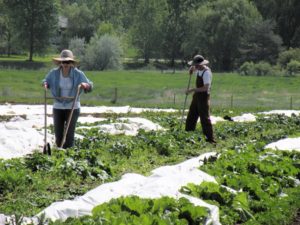Local farmers and those who are food-insecure face major challenges as the COVID-19 pandemic continues to impact our community. Changes in day-to-day agricultural production along with the disruption of local and global supply chains have impacted food systems across the nation.
“Boulder County is committed to supporting a sustainable and just food system for all of its residents,  especially in these uncertain times,” said Tim Broderick, Senior Sustainability Strategist for Boulder County’s Office of Sustainability, Climate Action & Resilience. “We’re proud of the programs and adaptations that have been developed by our agricultural community in the face of this crisis.”
especially in these uncertain times,” said Tim Broderick, Senior Sustainability Strategist for Boulder County’s Office of Sustainability, Climate Action & Resilience. “We’re proud of the programs and adaptations that have been developed by our agricultural community in the face of this crisis.”
With the spring growing season officially underway in Colorado, there are ways the public can help neighbors and local food producers affected by the virus outbreak.
“Boulder County Farmers Markets is currently running a pick-up and drive through operation where people can preorder veggie boxes with other add-ons like eggs, tortillas, and bread,” said Amelia Hulbert, Healthy Eating, Active Living Specialist at Boulder County Public Health. “We worked closely with them to develop a process to ensure social distancing, minimal contact with bags, hand sanitizing after handling each order, and taking temperatures of staff and volunteers.”
Here are five ways Boulder County residents can support local farmers and food insecure individuals during the COVID-19 pandemic:
- Patronize a virtual farmers market. BCFM2Go, a virtual extension of Boulder County Farmers Markets, was launched in response to the COVID-19 crisis. Orders can be placed online and collected via their drive through operation. Learn more at https:// bcfm.localfoodmarketplace.com/. BCFM2Go also accepts SNAP and other food-purchasing assistance programs through a different online order form. WIC families can receive a $20 value produce box for free by showing their valid eWIC card. Learn more at https://bcfm.org/programs/food-access/ or email foodaccess@bcfm.org for more information.
- Purchase food from a local farm stand. Many farm stands are functioning with additional health and safety precautions set in place. Measures include social distancing, the utilization of protective face masks, and asking those with symptoms to stay home. Some farms are offering pre-boxed options for vegetables and other products. Depending on location, the public can place orders online or research opening hours to find a convenient time to visit in person. To support your local farmers all season, Community Supported Agriculture (CSA) shares can also be purchased online. CSAs ensure a steady income for farmers. To locate nearby farm stands and CSAs, visit Boulder County Farmers Markets’ “find your farmer” database at https://bcfm.org/find-your-farmer/ .
- Grow a row. Community Food Share, located in Louisville, operates a garden share program where home gardeners can donate freshly picked fruit, vegetables, and herbs. Gardeners can pledge to set aside a row of produce to grow, harvest, and donate to individuals and families facing food insecurity. Make a pledge to Grow a Row at https://communityfoodshare.org/donations/donate-food/garden-share/. Residents can also check with their local food bank to see if they have similar programs in place.
- Grow and give. Home gardeners can also grow and donate produce through Colorado State University Extension’s Grow & Give Modern Victory Garden Project. This program offers free resources and training for anyone who would like to grow their own modern day ‘Victory Garden’ — a reference to gardens planted at private residences and public parks during the World Wars to indirectly aid the war effort and boost public morale. Visit www.growandgivecolorado.org to learn more and register your home or community garden.
- Support restaurants that buy from local farmers. Many restaurants are offering to-go options that include food items made with local meat, vegetables, cheese, and more. To identify which restaurants are sourcing food and ingredients from local farms, review online menus or call to ask.
For more information about Boulder County’s sustainability mission and to learn about other programs, visit www.boco.org/sustainability.

Comments are closed.